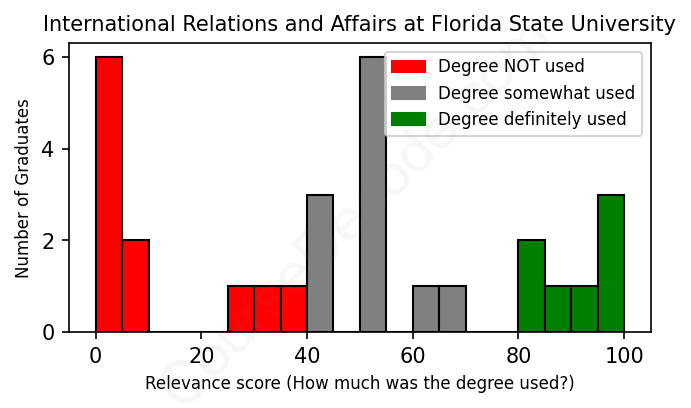
First, some facts. Of the International Relations and Affairs graduates from Florida State University we've analyzed , here's how many have used (or NOT used) their degree in their career:

These are estimates based on AI analysis of 29 LinkedIn profiles (see below).
The verdict? Bad. Overall, with an average relevance score of 45%, International Relations and Affairs graduates from Florida State University have a substantially lower likelihood (-22%) of finding work in this field compared to the average graduate across all fields:
And for comparison, here's the chart for all profiles we've looked at across all degrees.
Also, after graduating, only 34% of these graduates have pursued further education other than another Bachelor's degree (such as a Masters degree or other), compared to the average across all profiles of 35%. This suggests a Bachelors degree is enough for most International Relations and Affairs graduates, and it's normal to look for work straight after graduation.
See the details:
|
Relevance score: 82% We think this person has gone into a career highly relevant to their degree. We think this person has gone into a career highly relevant to their degree.
DEGREE INFOGraduated in 2013 from Florida State University with a Bachelor of Arts (B.A.) in International Relations and Affairs. Also pursued further education since (see below). JOB HISTORY SINCE GRADUATIONManager Jerry's Cigars Inc. Jun 2013 - Dec 2014 Vendor Onboarding Specialist  Siemens Mar 2015 - Jun 2015 Intern  The OBI Podcast Jan 2015 - Jan 2016 Officer Trainee  United States Air Force Jul 2015 - Mar 2016 Second Lieutenant  United States Air Force Mar 2016 - Mar 2018 First Lieutenant  United States Air Force Mar 2018 - Mar 2020 Captain, USAF  United States Air Force Mar 2020 - Present FURTHER DEGREES DONE SINCE GRADUATINGMaster of Science (M.S.)Florida State University 2013 - 2014 ABOUTNo information provided. |
The top 10 most common jobs done by the graduates we've analyzed (ranked most common to least) are:
From analyzing various LinkedIn profiles of graduates from Florida State University who studied International Relations and Affairs, it's clear that many of them ended up in careers that aren't directly tied to their degree. A significant trend is people entering fields like law, marketing, customer service, and even some military roles. For those working as attorneys, they often found a strong connection to their International Relations studies, especially in areas concerning international law, human rights, and negotiation. On the other hand, many graduates landed jobs like customer service representatives, sales roles, and positions in retail, which don’t really leverage the specialized knowledge gained from an International Relations degree.
While some jobs offered a glimpse into the realms of international relations, such as the positions with the military or roles dealing with government policy, the bulk of the career paths taken by these graduates lean toward industries and roles that require very little to no direct application of what they studied. This means that, generally speaking, many of these graduates aren’t using their degree in a way that the program might suggest they would be. It highlights a common scenario where people end up working outside their field of study, which is pretty normal, especially in today's job market. So, if you're considering a degree in International Relations, it's essential to be aware that while it can open some doors, the direct application of that knowledge in jobs may not be as straightforward as it seems.
Here is a visual representation of the most common words in job titles for International Relations and Affairs graduates (this is across all International Relations and Affairs graduates we've analyzed, not just those who went to Florida State University):

Graduates from Florida State University's International Relations and Affairs program have embarked on a diverse range of career paths that reflect a mix of success and divergence from their field of study. In their early careers, many graduates often start with jobs that may not fully utilize their degree, such as customer service roles or even as loan originators. However, some seem to have found opportunities directly related to international affairs, such as positions in the military or governmental roles, indicating a potential for growth in areas relevant to their studies right out of college. For example, there are graduates who immediately entered roles as cryptologic linguists in the Air Force or took on positions within various governmental departments, which points to some strong career beginnings aligning with their degree.
Fast forward five to ten years, there appears to be a split in their career trajectories. On one hand, you have those who have advanced significantly within their relevant fields, such as graduates moving into senior roles in government or law, which can be seen as a validation of their degree's value. On the other hand, several alumni have transitioned into careers that bear little relation to International Relations and Affairs. Many have gravitated towards sales, customer service, or management roles that don't utilize their educational background. Specifically, some have become real estate agents or have found their way into retail positions, suggesting a degree of underemployment for those hoping to dive deep into international relations but instead finding themselves in more generalized job markets. Overall, while some graduates manage to find impactful roles in their field, a notable number seem to stray towards careers that, while successful, do not leverage their International Relations education directly.
Honestly, a Bachelor’s degree in International Relations and Affairs at Florida State University, like many programs in this field, can be a bit of a mixed bag. It’s not super easy, but it’s also not impossible if you’re willing to put in the effort. You’ll cover a lot of ground, diving into politics, economics, cultures, and global issues—so it requires some serious reading and critical thinking. If you enjoy discussing world events and have a genuine interest in how countries interact, you might find it pretty engaging. Just expect a decent amount of research papers and discussions, but it's definitely manageable if you're motivated and stay organized!
Most commonly, in the LinkedIn profiles we've looked at, it takes people 4 years to finish a Bachelor degree in International Relations and Affairs.
Looking at the career paths of these International Relations and Affairs grads from Florida State, it's a mixed bag in terms of income. Some of the folks who went into law or military roles, like the attorney who’s now a Senior Counsel or the officer climbing ranks in the Air Force, are likely pulling in solid salaries, especially as they gain experience. On the flip side, there are others who started in more entry-level or service-oriented positions, like retail or customer service, and might still be trying to climb that pay ladder. It seems like those who took a more traditional career route in legal, military, or specialized fields are probably making decent money, while others are still figuring it out. So overall, yes, some are doing well, but others might still be in the grind to earn more.
Here is a visual representation of the most common words seen in the "about" section of LinkedIn profiles who have a Bachelor degree in International Relations and Affairs (this is across all International Relations and Affairs graduates we've analyzed, not just those who went to Florida State University). This may or may not be useful:

Here are all colleges offering a Bachelor degree in International Relations and Affairs (ordered by the average relevance score of their International Relations and Affairs graduates, best to worst) where we have analyzed at least 10 of their graduates:
| College | Score | Count |
|---|---|---|
 The George Washington University The George Washington University
|
70 | 36 |
 American University American University
|
64 | 21 |
 Boston University Boston University
|
63 | 12 |
 The University of Georgia The University of Georgia
|
56 | 21 |
 University of Southern California University of Southern California
|
56 | 13 |
 James Madison University James Madison University
|
53 | 11 |
 University of California, Davis University of California, Davis
|
50 | 11 |
 University of Colorado Boulder University of Colorado Boulder
|
49 | 16 |
 Florida International University Florida International University
|
47 | 36 |
 Florida State University Florida State University
|
45 | 29 |